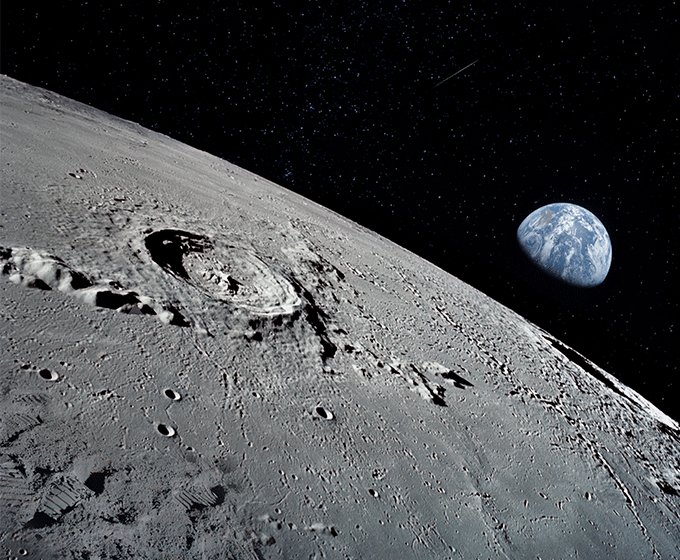
DECEMBER 10, 2024 — UTSA’s Office of Research today announced the launch of the Center for Space Technology and Operations Research (CSTOR), a new research center dedicated to advancing engineering, technology and operations that will support space missions between the Earth and the Moon, an area referred to as cislunar space, as well as the lunar surface. The center will address the growing demand for research and workforce development by civil, commercial and national security space agencies and companies. David Silva, UTSA distinguished professor of physics and astronomy, will serve as the center’s inaugural director.
CSTOR will provide enhanced support to the more than 35 UTSA researchers and over 200 students working on space technology related research and career development in areas such as uncrewed spacecraft, lunar habitation, hypersonics and propulsion. It will further augment the university’s effort to attract even more of the nation’s brightest minds in space technology through UTSA's clustered and connected faculty hiring plan, supported by the UT System Board of Regents’ Research Excellence Program.
“UTSA has intentionally expanded its capacity, facilities and expertise in space technology to meet the rapidly growing demand for innovation and enable stronger comprehensive partnerships with key organizations like Southwest Research Institute and Department of Energy National Labs,” said UTSA President Taylor Eighmy. “The launch of this new center positions UTSA as a destination for innovation, knowledge creation and talent development for the space economy.”
Technology and workforce development for the space economy is a growing priority in federal and state policy. In 2022, the White House Office of Science and Technology Policy released a strategy outlining its approach to cislunar space, titled the National Cislunar Science and Technology (S&T) Strategy. The plan affirms the growing role of cislunar space in diplomacy and national security and aims to bolster support for research and development in the field. At the state level, the Texas Space Commission was established in 2024 to sustain and grow Texas’ leadership in space exploration.
 David Silva
David Silva“We may not always think about space technology as being integral to national security,” Silva said, “but when you consider the fact that our daily lives rely on satellites for GPS services, telecommunications and weather forecasting, it's clear that cislunar space is a linchpin in our national defense. Our new center is poised to leverage UTSA expertise to strengthen national security and Texas leadership in the emerging trillion-dollar cislunar economy.”
Satellites can also be used in agriculture, logistics and energy to monitor crops, traffic patterns and energy grids. They can optimize supply chains and strengthen maritime security by monitoring ports. They also provide key insight into the environment, for instance by monitoring freshwater availability providing early warnings of natural disasters such as floods and wildfires.
Space infrastructure represents a rapidly growing market in the global economy. A 2022 McKinsey & Company report projects that the industry will grow from $630 billion in 2023 to $1.8 trillion by 2035. This growth will be catalyzed by the rapidly increasing cost-effectiveness of launch, which has been enabled by companies based or operating in Texas such as Blue Origins, Firefly and SpaceX. This expansion will likely spur corresponding growth in the job market, with U.S. aerospace engineering jobs expected to increase by 6% between 2023 and 2033.
CSTOR will support a range of technological space research focus areas in which UTSA excels, including advanced chemical propulsion, fuel for nuclear thermal propulsion (NTP), lunar habitation and surface operations, secure satellite communications and vehicle atmospheric reentry. UTSA is also home to space-related expertise in advanced manufacturing, cybersecurity, energy storage in extreme environments, neuromorphic AI, power systems, robotics, and semiconductor devices for high-power, extreme environment applications.

Graduate research assistant Angelina Andrade adjusts a test rocket in the wind tunnel at the UTSA Hypersonics Lab.
UTSA’s space technology capabilities are further supported by several research centers and facilities. These include the Hypersonics Lab, the Center for Advanced Measurements in Extreme Environments, the Kleberg Advanced Microscopy Center, the Planetary Material CHaractErization Facility (PMCHEF), the Laser Spectroscopy and Chemical Propulsion Lab, the Wireless Next Generation Systems Laboratory, the Heat and Mass Transfer Experimental Rheology Lab, the Extreme Environments Materials Laboratory, the Laboratory of Turbulence, Sensing, & Intelligence Systems, the Next Generation Networks Laboratory (NGNL) and the Unmanned Systems Lab.
CSTOR will collaborate closely with the National Security Collaboration Center to promote research aimed at advancing and securing these and other critical systems, as well as UTSA’s other existing centers, including the Cybersecurity Manufacturing Innovation Institute, the Center for Infrastructure Assurance and Security, the Institute for Cyber Security, the Cyber Center for Security and Analytics, as well as the NSF CREST Center for Security and Privacy Enhanced Cloud Computing.
UTSA Today is produced by University Communications and Marketing, the official news source of The University of Texas at San Antonio. Send your feedback to news@utsa.edu. Keep up-to-date on UTSA news by visiting UTSA Today. Connect with UTSA online at Facebook, Twitter, Youtube and Instagram.
Enjoy snacks while connecting with Adobe reps and student ambassadors. Download or log into the Adobe Express app to snag swag and unlock exclusive back-to-school templates. It’s a fun, fast way to get creative and start the school year with bold moves.
Central Plaza, Main CampusCelebrate the merger of UTSA and UT Health San Antonio with a pop-up featuring free t-shirts, exclusive swag, and interactive photo opportunities. Open to all students, faculty and staff. Supplies are limited!
Sombrilla Plaza, Main CampusHuddle Against Hunger is a fundraising competition with Texas State that benefits our Roadrunner Pantry. Donations this week will help UTSA earn additional prize monies provided by RBFCU.
In-Person and VirtualJoin UTSA Libraries for an update on federal public access policies and how the library can assist with compliance.
Virtual EventWe invite you to join us for Birds Up! Downtown, an exciting welcome back event designed to connect students with the different departments at the Downtown Campus. Students will have the opportunity to learn about some of the departments on campus, gain access to different resources, and collect some giveaways!
Bill Miller PlazaThere are many citation managers. Which one is right for you? This workshop will explain what a citation manager is and how it can help you organize your citations, insert citations as you write your paper, and generate your bibliography.
Virtual EventPubMed is an essential database for anyone conducting biomedical or health-related research. This workshop will teach attendees how to effectively navigate this free resource and locate peer-reviewed articles using advanced search features, MeSH subject headings, and Boolean operators.
Virtual EventThe University of Texas at San Antonio is dedicated to the advancement of knowledge through research and discovery, teaching and learning, community engagement and public service. As an institution of access and excellence, UTSA embraces multicultural traditions and serves as a center for intellectual and creative resources as well as a catalyst for socioeconomic development and the commercialization of intellectual property - for Texas, the nation and the world.
To be a premier public research university, providing access to educational excellence and preparing citizen leaders for the global environment.
We encourage an environment of dialogue and discovery, where integrity, excellence, respect, collaboration and innovation are fostered.